2017-2018英语(外研版)同步讲练课件:必修1Module 5 A Lesson in a Lab--第4课时(共70张含答案)
文档属性
| 名称 | 2017-2018英语(外研版)同步讲练课件:必修1Module 5 A Lesson in a Lab--第4课时(共70张含答案) |
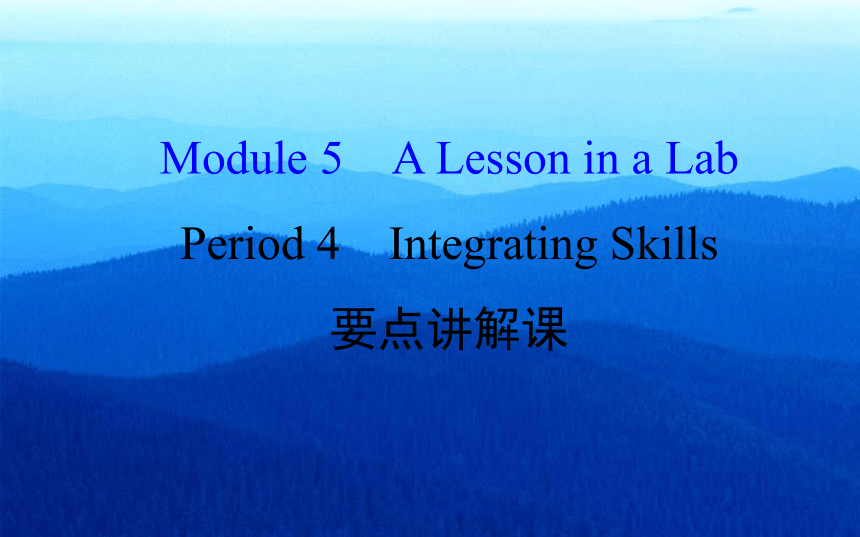
|
|
| 格式 | zip | ||
| 文件大小 | 1.2MB | ||
| 资源类型 | 教案 | ||
| 版本资源 | 外研版 | ||
| 科目 | 英语 | ||
| 更新时间 | 2017-09-10 00:00:00 | ||
图片预览

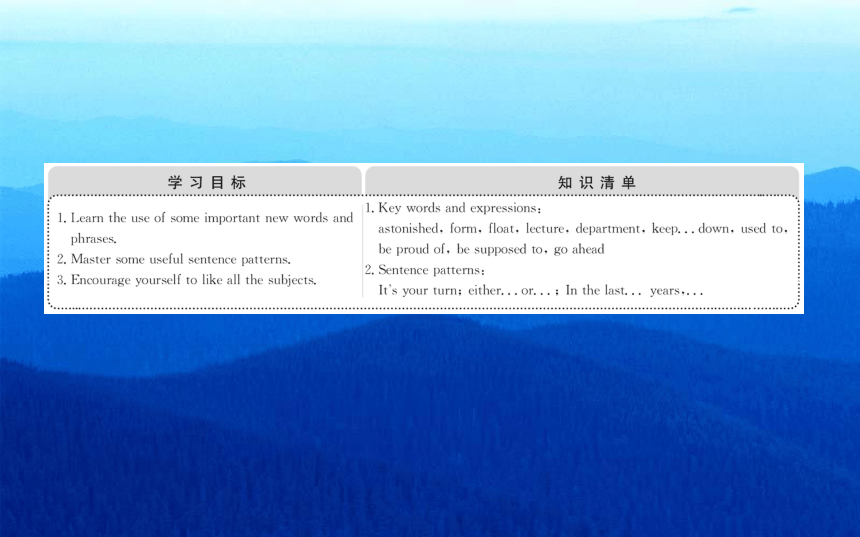
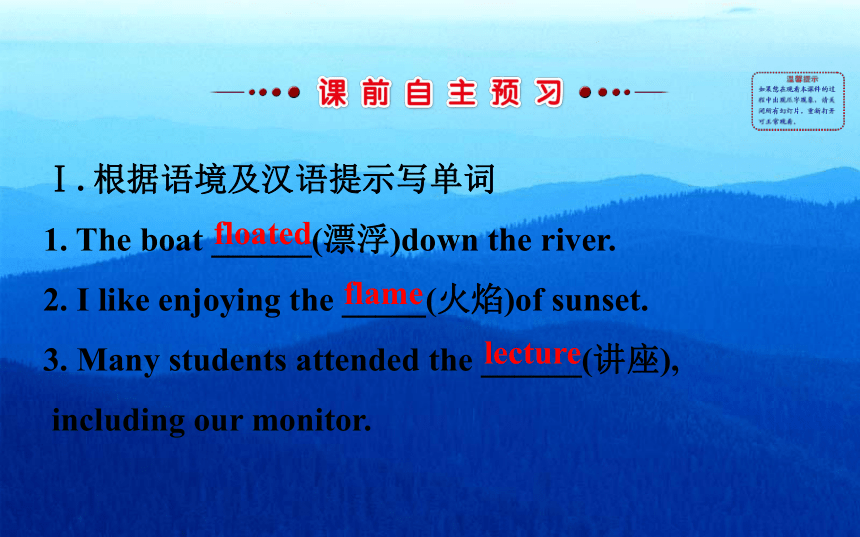
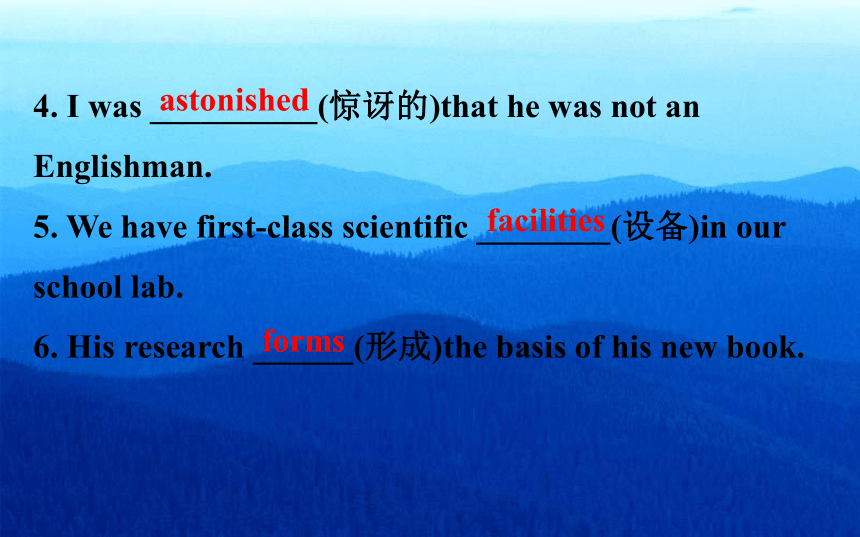
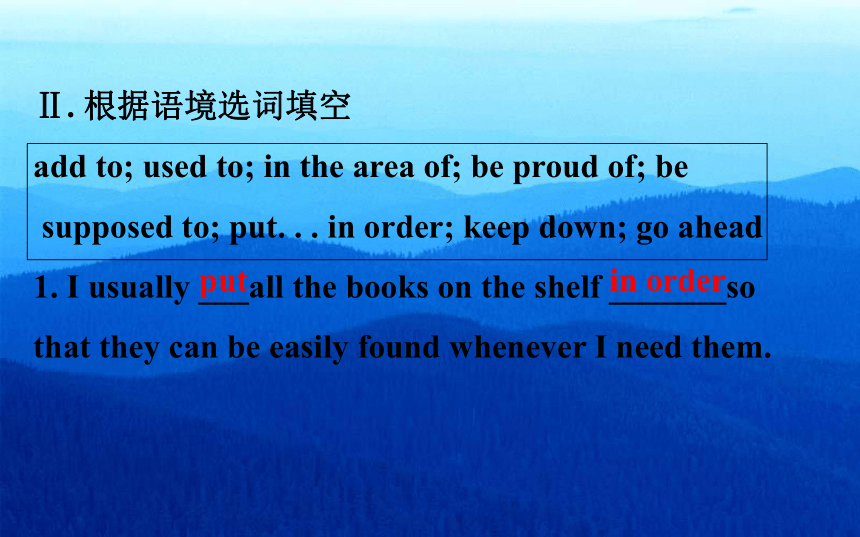

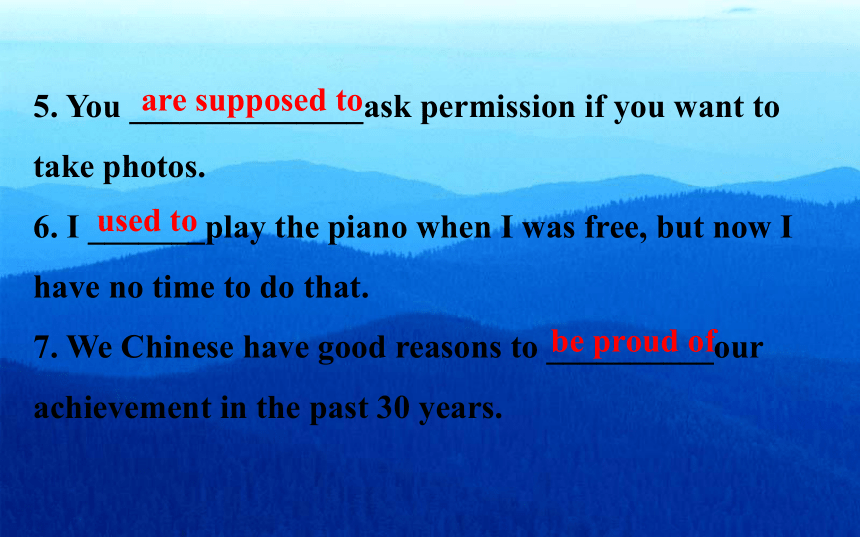
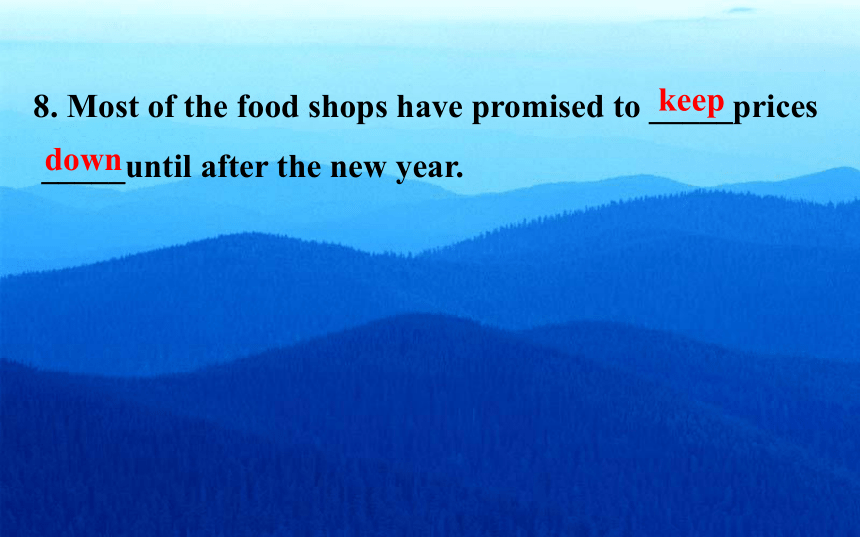
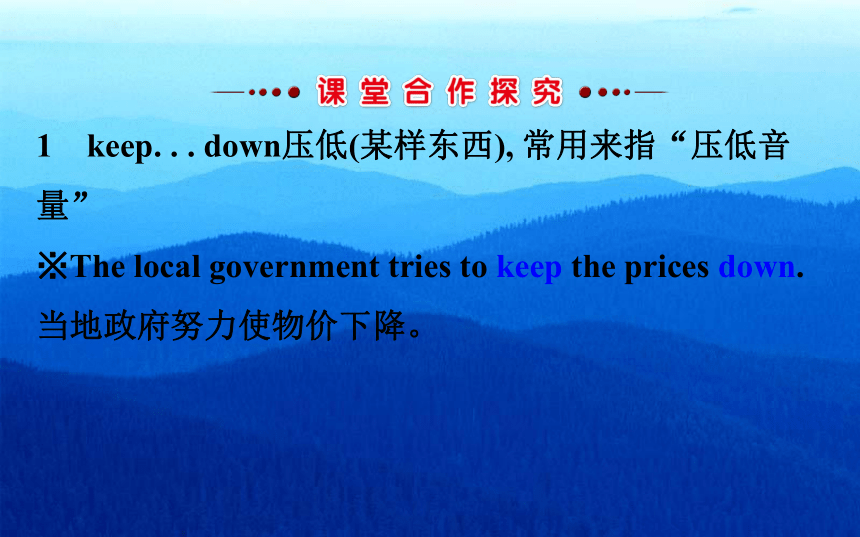
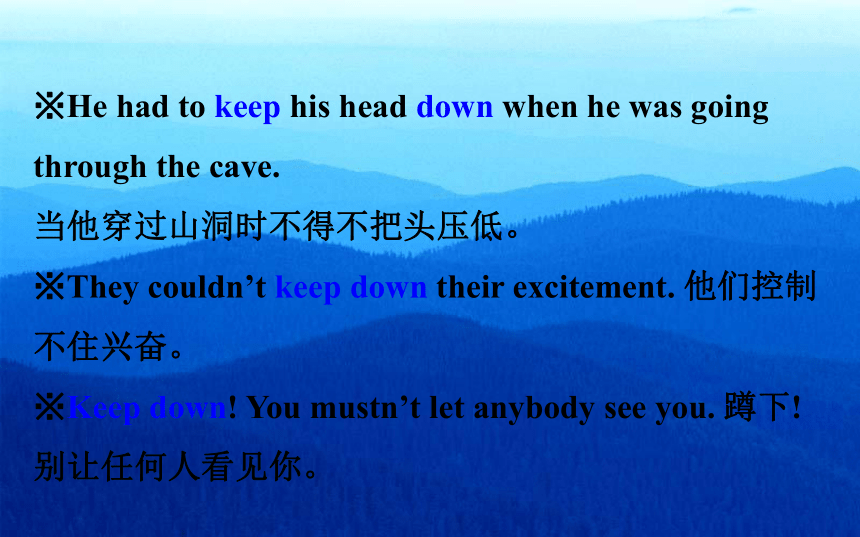

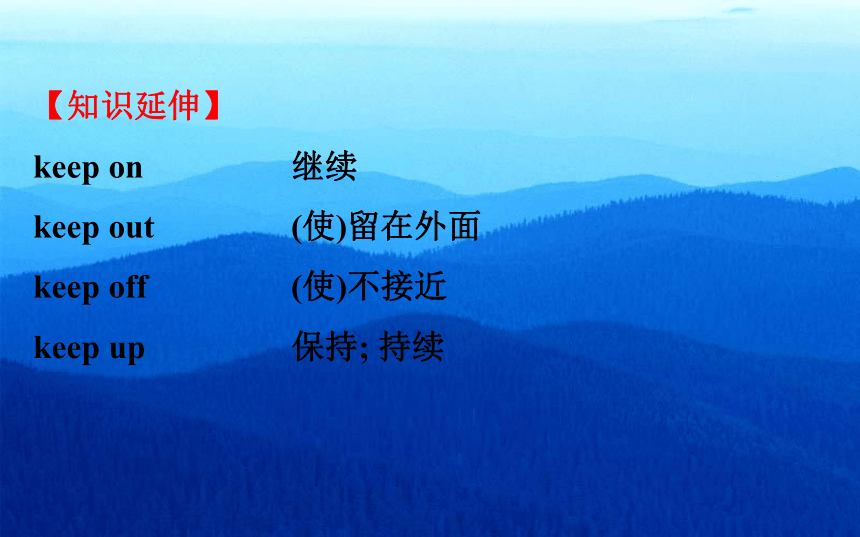
文档简介
课件70张PPT。Module 5 A Lesson in a Lab
Period 4 Integrating Skills
要点讲解课Ⅰ. 根据语境及汉语提示写单词
1. The boat ______(漂浮)down the river.
2. I like enjoying the _____(火焰)of sunset.
3. Many students attended the ______(讲座),
including our monitor. floatedflamelecture4. I was __________(惊讶的)that he was not an
Englishman.
5. We have first-class scientific ________(设备)in our
school lab.
6. His research ______(形成)the basis of his new book. astonishedfacilitiesformsⅡ. 根据语境选词填空
add to; used to; in the area of; be proud of; be
supposed to; put. . . in order; keep down; go ahead
1. I usually ___all the books on the shelf _______so
that they can be easily found whenever I need them. putin order2. The reforms ____________health care are necessary
and important.
3. This show will no doubt ______his growing
reputation among the people.
4. The building of the new bridge will ________as
planned. in the area ofadd togo ahead5. You ______________ask permission if you want to
take photos.
6. I _______play the piano when I was free, but now I
have no time to do that.
7. We Chinese have good reasons to __________our
achievement in the past 30 years. are supposed toused tobe proud of8. Most of the food shops have promised to _____prices
_____until after the new year. keepdown1 keep. . . down压低(某样东西), 常用来指“压低音量”
※The local government tries to keep the prices down. 当地政府努力使物价下降。 ※He had to keep his head down when he was going through the cave.
当他穿过山洞时不得不把头压低。
※They couldn’t keep down their excitement. 他们控制不住兴奋。
※Keep down! You mustn’t let anybody see you. 蹲下! 别让任何人看见你。【自我归纳】
keep down除了有“压低”之意外, 还有“_____”
“_____”之意。控制蹲下【知识延伸】
keep on 继续
keep out (使)留在外面
keep off (使)不接近
keep up 保持; 持续※After his illness, the man was warned to keep off fatty foods.
这个人病了之后, 他被警告不要吃高脂肪食物。【活学活用】
①I often do exercise to _____my weight _____.
我经常锻炼来减轻我的体重。
②The company tries to keep down the cost.
译: _______________________keepdown这个公司试图降低成本。用合适的介词或副词填空。
③Don’t lose heart. Keep ___working hard and you will
succeed.
④Please keep ___the tigers. It’s dangerous to take
photos with them.
⑤In face of failure, we should keep ___a good state. onoffup2 used to过去(常常)
※I never used to enjoy science, but last year I changed schools, and the science teachers at my new school are excellent. 以前我从来不喜欢理科, 但是去年我换了学校, 我的新学校里的理科老师非常棒。※I usedn’t/didn’t use to get up early, but I do now.
我过去起得晚, 但现在我起得早了。
※Did he use/Used he to go there? 他以前常去那儿吗?
※I’m sure I’ll get used to the hard work. 我相信我会习惯这份艰苦的工作的。【自我归纳】
①used to do只用于过去时, 其否定形式是____________
或didn’t use to do, 疑问句形式是Did sb. use to. . . 或
____________。
②be/get used to意思是“___________”, to是介词, 后
接名词或 v. -ing形式。used not to doUsed sb. to. . .习惯于……【联想拓展】
(1)be used to有时可能是动词use的被动语态结构, 此时意为“被用来”。
A knife can be used to cut bread. 刀可用来切面包。
(2)used to过去经常而现在不再这样, 而would与现在没有联系; used to可表示过去的动作和状态, would可表示过去的习惯性动作。【活学活用】
①He ____ __ play basketball here.
他过去常在这儿打篮球。
②I’m used to ______ ___ early at six o’clock every
morning.
我习惯每天早上六点钟早早起床。usedtogettingup③—Is your father still a worker?
—No, but ___ ____ __ ___(他以前是).
④I ______ ___ under a big tree in front of my house as
a child.
孩提时我经常坐在我家房前大树下。heusedtobewouldsit3 be proud of为……感到骄傲/自豪
※The Nobel Prize is the highest scientific prize there is, so we should be very proud of that. 诺贝尔奖是最高的科学奖, 所以我们应该为此而感到骄傲。※He is proud of being a member of the football team.
他以作为足球队的一员感到骄傲。
※Tom is proud to join our party. 汤姆为能参加我们的派对而感到自豪。
※We should all take pride in these successes.
我们都应该为这些成功(的事情)感到自豪。【自我归纳】
①be proud of后可接名词、代词、 v. -ing形式和what
引导的从句。
②be proud to do sth. _______________
③___________ 为……感到自豪做某事感到自豪take pride in【活学活用】
①He __ ______ __ what you have achieved.
他为你所取得的成就而骄傲。
②They _____ ______ __ ______ to such a fine team.
他们为属于这么好的一个队而自豪。isproudofwereproudtobelong③People in China are proud of what we have achieved
in the past ten years. (句型转换)
→People in China ____ _____ __ what we have achieved
in the past ten years. takepridein4 be supposed to应当; 理应
※Everyone is supposed to wear a seat-belt in the car.
每个人在汽车里都应该系安全带。
※You are not supposed to take the books out of the room.
你不能把这些书拿出屋去。※This isn’t what we are supposed to be discussing.
这不是我们现在应该讨论的。
※You are supposed to have handed in your homework by now.
现在你应该已经把作业交上来了。【自我归纳】
①be supposed to意为“应该……”; “被期望……”;
be为过去式时表示“_______”。
②be not supposed to do sth. _____________
③be supposed to ________ 现在应该(正)做……
④be supposed to _____________
本应该做某事而没做本应该不应该做某事be doinghave done sth.【活学活用】
①In your country, what ___ ____ ________ __ (你应该)
do when you meet someone for the first time?
②The message is very important, so it __ ________ __
(应该)be sent as soon as possible. areyousupposedtoissupposedto③You ___ ___ ________ __ (不应该)refer to your notes
during any test in our school.
语法填空。
④I am supposed ______________(finish)all my
shopping by now, but I still have a great many to buy. arenotsupposedtoto have finished5 astonished adj. 吃惊的; 惊愕的
※He was astonished when he saw his father here.
当他看到他爸爸在这儿时, 他很吃惊。
※I was astonished at/by the news. 这消息着实让我吃了一惊。※She was astonished to hear what had happened. 她听到所发生的事感到惊讶。
※I’m astonished that he didn’t pass the exam. 他考试没有及格, 对此我感到很惊讶。【自我归纳】
①___________________ 对……感到惊讶
②be astonished to see/find/hear/learn
________________________
③be astonished that _______________be astonished at/by. . .惊讶地看到/发现/听到/得知对……感到惊讶【知识延伸】
astonish vt. 使……惊讶; 使……震惊
astonishing adj. 令人惊讶的(指事物本身的特征)
astonishment n. 惊奇; 惊讶
to one’s astonishment 令人感到惊讶的是……
in astonishment 吃惊地; 惊讶地【活学活用】
①I was so __________ _____ his __________ answer.
他惊人的答复让我很吃惊。
②___ ____ ____________, there was a light in one of
the cabins.
让我们吃惊的是, 有间小屋里亮着一盏灯。astonishedat/byastonishingToourastonishment③What he said at the meeting __________ _________
present. 他在会议上所说的话使在场的每个人都很震
惊。
④She ____ __________ ____ you had not come here.
她因为你没有来这里感到惊讶。astonishedeverybodywasastonishedthat⑤From her __________expression, I knew she hadn’t
expected I would ask her such an __________question.
(astonish)astonishedastonishing【备选要点】
Go ahead! 可以, 行, 开始吧, 提前走
※—May I ask you a question?
—Yes, go ahead!
——我可以问你一个问题吗?
——可以, 问吧! ※Don’t give up; go ahead with your plan. 不要放弃, 继续你的计划吧。
※You go ahead and tell him that we’re coming.
你先走一步, 告诉他我们这就来。【自我归纳】
①表示同意对方的请求。根据情况可译为“__________
______________”。
②表示继续或持续。表示请对方继续说、继续做等, 通
常可译为“___________”。
③表示请对方先走或先做某事, 可译为“___________
_______”。说吧, 做吧,开始吧, 进行吧继续……吧你先走一步,你先请【活学活用】
①You ___ ______, and I’ll join you shortly.
你们先开始, 我一会儿就加入你们。
②Please ___ ______ ____ your story.
请继续讲你的故事。goaheadgoaheadwith③—Could I use your English dictionary for a few
minutes?
—___ ______ (可以, 用吧). I’m not using it myself.
④—What will we do tomorrow?
—It is unclear whether the meeting will ___ ______
(进行). Goaheadgoahead【课堂小结】
Ⅰ. 词汇串记
In northern China, foggy days are very common
in winter, which is formed by much steam floating in
the air. More and more factories and cars pollute
the air and break the balance of nature. In recent
years, people are astonished to see too much haze(雾霾)in winter. The experts also give lectures that plans should be made and many more facilities are needed to reduce the air pollution. Ⅱ. 句式背诵
1. We are astonished to hear that he failed in the exam.
我们很震惊地听说他考试没有通过。
2. They are supposed to have finished their homework now.
他们本应该现在完成他们的作业的。3. Go ahead and turn left at the post office.
一直向前, 在邮局处向左拐。
4. Either she or Tom is to blame for the broken glass.
或者她或者汤姆应该为打碎的玻璃受到责备。5. If you want to be a top student, you are supposed to try to keep a balance between work and rest.
如果你想成为一名尖子生, 你应该尽量做到劳逸结合。如何写实验报告
实验报告是把实验目的、方法、过程、结果等记录下来, 经过整理写成的书面汇报材料。注意事项: 1. 实验报告要有确证性、纪实性, 以及固定格式。要求内容实事求是, 分析全面具体;
2. 语言简明扼要, 文字简练通顺, 誊写清楚整洁。 请根据下列表格中的内容, 写一篇100个词左右的短文, 说明整个实验的内容。 Step 1 审题谋篇Step 2 遣词造句
1. 实验的目的是看看镁在空气中燃烧重量上是否有变
化。
①发现, 查出来 _______
②用if引导宾语从句, 用when引导时间状语从句:
____________________________________________
____________________________________________find outThe aim of the experiment is to find out if there’s achange in weight when magnesium burns in the air.2. 为了进行这个实验, 你需要准备以下东西。
①施行, 执行 ________
②下列东西 _________________
③翻译: (用to do不定式)
____________________________________________
______carry outthe following thingsTo carry out the experiment you need the followingthings.3. 首先把镁放进坩埚内。
①把……放进里面 ________
②根据示例结构仿写句子:
First, put the sweets in the box.
(用first, put. . . in结构仿写句子)
___________________________________put. . . inFirst, put the magnesium in the crucible.4. 把坩埚放在本生灯上。
①把……放在上面 _______________
②翻译:
_________________________________put/hold. . . overHold the crucible over Bunsen burner.5. 镁比原来重了一点。
①比……多一点 _______________
②翻译:
______________________________________a little more thanMagnesium weighs a little more than before.6. 你得出结论, 镁在空气中燃烧重量上有变化。
①得出结论 ________________draw a conclusion②合并句子: (用同位语从句和时间状语从句)
You can draw a conclusion.
There’s a change in weight.
Magnesium burns in the air.
____________________________________________
____________________________________You can draw a conclusion that there’s a change inweight when magnesium burns in the air.Step 3 润色组篇
(注意使用关联词: if, when, first, second/then, next, finally等)
The aim of the experiment is to find out if there’s a change in weight when magnesium burns in the air. To carry out the experiment, you need the following things: magnesium, a Bunsen burner, a balance and a crucible. When all the things are ready, you can begin the experiment. First, put the magnesium in the crucible. Then put the crucible on the balance and weigh it. Light the Bunsen burner and hold the crucible over it. Next, heat the magnesium. Finally, weigh the magnesium again. Then, you have a result that it weighs a little more than before. Therefore, you can draw a conclusion that there is a change in weight when magnesium burns in the air. 【策略点拨】
Ⅰ. 写作指导
1. 明确主题: 实验报告因科学实验的对象而异。如化学实验的报告叫化学实验报告, 物理实验的报告就叫物理实验报告。
2. 明确文章类型。3. 掌握实验报告的要素: Aim实验目的; Apparatus实验器材; Method实验步骤; Result实验结果; Conclusion实验结论。
4. 文章结构要清晰: 注意要按照实验报告的结构, 将文章的要素有机地结合起来。Ⅱ. 常见的短语和句型
1. Aim: To find out. . . ; in order to. . .
2. Introduction: . . .
3. Method: (1). . . (2). . . (3). . . ; firstly, secondly. . .
4. Result: (时间)later. . .
5. Conclusion: in a word. . . 6. In this lab, we explore. . .
7. In this experiment it was assumed that. . .
8. . . . was/were used to test. . .
9. The experiment’s results prove. . .
Period 4 Integrating Skills
要点讲解课Ⅰ. 根据语境及汉语提示写单词
1. The boat ______(漂浮)down the river.
2. I like enjoying the _____(火焰)of sunset.
3. Many students attended the ______(讲座),
including our monitor. floatedflamelecture4. I was __________(惊讶的)that he was not an
Englishman.
5. We have first-class scientific ________(设备)in our
school lab.
6. His research ______(形成)the basis of his new book. astonishedfacilitiesformsⅡ. 根据语境选词填空
add to; used to; in the area of; be proud of; be
supposed to; put. . . in order; keep down; go ahead
1. I usually ___all the books on the shelf _______so
that they can be easily found whenever I need them. putin order2. The reforms ____________health care are necessary
and important.
3. This show will no doubt ______his growing
reputation among the people.
4. The building of the new bridge will ________as
planned. in the area ofadd togo ahead5. You ______________ask permission if you want to
take photos.
6. I _______play the piano when I was free, but now I
have no time to do that.
7. We Chinese have good reasons to __________our
achievement in the past 30 years. are supposed toused tobe proud of8. Most of the food shops have promised to _____prices
_____until after the new year. keepdown1 keep. . . down压低(某样东西), 常用来指“压低音量”
※The local government tries to keep the prices down. 当地政府努力使物价下降。 ※He had to keep his head down when he was going through the cave.
当他穿过山洞时不得不把头压低。
※They couldn’t keep down their excitement. 他们控制不住兴奋。
※Keep down! You mustn’t let anybody see you. 蹲下! 别让任何人看见你。【自我归纳】
keep down除了有“压低”之意外, 还有“_____”
“_____”之意。控制蹲下【知识延伸】
keep on 继续
keep out (使)留在外面
keep off (使)不接近
keep up 保持; 持续※After his illness, the man was warned to keep off fatty foods.
这个人病了之后, 他被警告不要吃高脂肪食物。【活学活用】
①I often do exercise to _____my weight _____.
我经常锻炼来减轻我的体重。
②The company tries to keep down the cost.
译: _______________________keepdown这个公司试图降低成本。用合适的介词或副词填空。
③Don’t lose heart. Keep ___working hard and you will
succeed.
④Please keep ___the tigers. It’s dangerous to take
photos with them.
⑤In face of failure, we should keep ___a good state. onoffup2 used to过去(常常)
※I never used to enjoy science, but last year I changed schools, and the science teachers at my new school are excellent. 以前我从来不喜欢理科, 但是去年我换了学校, 我的新学校里的理科老师非常棒。※I usedn’t/didn’t use to get up early, but I do now.
我过去起得晚, 但现在我起得早了。
※Did he use/Used he to go there? 他以前常去那儿吗?
※I’m sure I’ll get used to the hard work. 我相信我会习惯这份艰苦的工作的。【自我归纳】
①used to do只用于过去时, 其否定形式是____________
或didn’t use to do, 疑问句形式是Did sb. use to. . . 或
____________。
②be/get used to意思是“___________”, to是介词, 后
接名词或 v. -ing形式。used not to doUsed sb. to. . .习惯于……【联想拓展】
(1)be used to有时可能是动词use的被动语态结构, 此时意为“被用来”。
A knife can be used to cut bread. 刀可用来切面包。
(2)used to过去经常而现在不再这样, 而would与现在没有联系; used to可表示过去的动作和状态, would可表示过去的习惯性动作。【活学活用】
①He ____ __ play basketball here.
他过去常在这儿打篮球。
②I’m used to ______ ___ early at six o’clock every
morning.
我习惯每天早上六点钟早早起床。usedtogettingup③—Is your father still a worker?
—No, but ___ ____ __ ___(他以前是).
④I ______ ___ under a big tree in front of my house as
a child.
孩提时我经常坐在我家房前大树下。heusedtobewouldsit3 be proud of为……感到骄傲/自豪
※The Nobel Prize is the highest scientific prize there is, so we should be very proud of that. 诺贝尔奖是最高的科学奖, 所以我们应该为此而感到骄傲。※He is proud of being a member of the football team.
他以作为足球队的一员感到骄傲。
※Tom is proud to join our party. 汤姆为能参加我们的派对而感到自豪。
※We should all take pride in these successes.
我们都应该为这些成功(的事情)感到自豪。【自我归纳】
①be proud of后可接名词、代词、 v. -ing形式和what
引导的从句。
②be proud to do sth. _______________
③___________ 为……感到自豪做某事感到自豪take pride in【活学活用】
①He __ ______ __ what you have achieved.
他为你所取得的成就而骄傲。
②They _____ ______ __ ______ to such a fine team.
他们为属于这么好的一个队而自豪。isproudofwereproudtobelong③People in China are proud of what we have achieved
in the past ten years. (句型转换)
→People in China ____ _____ __ what we have achieved
in the past ten years. takepridein4 be supposed to应当; 理应
※Everyone is supposed to wear a seat-belt in the car.
每个人在汽车里都应该系安全带。
※You are not supposed to take the books out of the room.
你不能把这些书拿出屋去。※This isn’t what we are supposed to be discussing.
这不是我们现在应该讨论的。
※You are supposed to have handed in your homework by now.
现在你应该已经把作业交上来了。【自我归纳】
①be supposed to意为“应该……”; “被期望……”;
be为过去式时表示“_______”。
②be not supposed to do sth. _____________
③be supposed to ________ 现在应该(正)做……
④be supposed to _____________
本应该做某事而没做本应该不应该做某事be doinghave done sth.【活学活用】
①In your country, what ___ ____ ________ __ (你应该)
do when you meet someone for the first time?
②The message is very important, so it __ ________ __
(应该)be sent as soon as possible. areyousupposedtoissupposedto③You ___ ___ ________ __ (不应该)refer to your notes
during any test in our school.
语法填空。
④I am supposed ______________(finish)all my
shopping by now, but I still have a great many to buy. arenotsupposedtoto have finished5 astonished adj. 吃惊的; 惊愕的
※He was astonished when he saw his father here.
当他看到他爸爸在这儿时, 他很吃惊。
※I was astonished at/by the news. 这消息着实让我吃了一惊。※She was astonished to hear what had happened. 她听到所发生的事感到惊讶。
※I’m astonished that he didn’t pass the exam. 他考试没有及格, 对此我感到很惊讶。【自我归纳】
①___________________ 对……感到惊讶
②be astonished to see/find/hear/learn
________________________
③be astonished that _______________be astonished at/by. . .惊讶地看到/发现/听到/得知对……感到惊讶【知识延伸】
astonish vt. 使……惊讶; 使……震惊
astonishing adj. 令人惊讶的(指事物本身的特征)
astonishment n. 惊奇; 惊讶
to one’s astonishment 令人感到惊讶的是……
in astonishment 吃惊地; 惊讶地【活学活用】
①I was so __________ _____ his __________ answer.
他惊人的答复让我很吃惊。
②___ ____ ____________, there was a light in one of
the cabins.
让我们吃惊的是, 有间小屋里亮着一盏灯。astonishedat/byastonishingToourastonishment③What he said at the meeting __________ _________
present. 他在会议上所说的话使在场的每个人都很震
惊。
④She ____ __________ ____ you had not come here.
她因为你没有来这里感到惊讶。astonishedeverybodywasastonishedthat⑤From her __________expression, I knew she hadn’t
expected I would ask her such an __________question.
(astonish)astonishedastonishing【备选要点】
Go ahead! 可以, 行, 开始吧, 提前走
※—May I ask you a question?
—Yes, go ahead!
——我可以问你一个问题吗?
——可以, 问吧! ※Don’t give up; go ahead with your plan. 不要放弃, 继续你的计划吧。
※You go ahead and tell him that we’re coming.
你先走一步, 告诉他我们这就来。【自我归纳】
①表示同意对方的请求。根据情况可译为“__________
______________”。
②表示继续或持续。表示请对方继续说、继续做等, 通
常可译为“___________”。
③表示请对方先走或先做某事, 可译为“___________
_______”。说吧, 做吧,开始吧, 进行吧继续……吧你先走一步,你先请【活学活用】
①You ___ ______, and I’ll join you shortly.
你们先开始, 我一会儿就加入你们。
②Please ___ ______ ____ your story.
请继续讲你的故事。goaheadgoaheadwith③—Could I use your English dictionary for a few
minutes?
—___ ______ (可以, 用吧). I’m not using it myself.
④—What will we do tomorrow?
—It is unclear whether the meeting will ___ ______
(进行). Goaheadgoahead【课堂小结】
Ⅰ. 词汇串记
In northern China, foggy days are very common
in winter, which is formed by much steam floating in
the air. More and more factories and cars pollute
the air and break the balance of nature. In recent
years, people are astonished to see too much haze(雾霾)in winter. The experts also give lectures that plans should be made and many more facilities are needed to reduce the air pollution. Ⅱ. 句式背诵
1. We are astonished to hear that he failed in the exam.
我们很震惊地听说他考试没有通过。
2. They are supposed to have finished their homework now.
他们本应该现在完成他们的作业的。3. Go ahead and turn left at the post office.
一直向前, 在邮局处向左拐。
4. Either she or Tom is to blame for the broken glass.
或者她或者汤姆应该为打碎的玻璃受到责备。5. If you want to be a top student, you are supposed to try to keep a balance between work and rest.
如果你想成为一名尖子生, 你应该尽量做到劳逸结合。如何写实验报告
实验报告是把实验目的、方法、过程、结果等记录下来, 经过整理写成的书面汇报材料。注意事项: 1. 实验报告要有确证性、纪实性, 以及固定格式。要求内容实事求是, 分析全面具体;
2. 语言简明扼要, 文字简练通顺, 誊写清楚整洁。 请根据下列表格中的内容, 写一篇100个词左右的短文, 说明整个实验的内容。 Step 1 审题谋篇Step 2 遣词造句
1. 实验的目的是看看镁在空气中燃烧重量上是否有变
化。
①发现, 查出来 _______
②用if引导宾语从句, 用when引导时间状语从句:
____________________________________________
____________________________________________find outThe aim of the experiment is to find out if there’s achange in weight when magnesium burns in the air.2. 为了进行这个实验, 你需要准备以下东西。
①施行, 执行 ________
②下列东西 _________________
③翻译: (用to do不定式)
____________________________________________
______carry outthe following thingsTo carry out the experiment you need the followingthings.3. 首先把镁放进坩埚内。
①把……放进里面 ________
②根据示例结构仿写句子:
First, put the sweets in the box.
(用first, put. . . in结构仿写句子)
___________________________________put. . . inFirst, put the magnesium in the crucible.4. 把坩埚放在本生灯上。
①把……放在上面 _______________
②翻译:
_________________________________put/hold. . . overHold the crucible over Bunsen burner.5. 镁比原来重了一点。
①比……多一点 _______________
②翻译:
______________________________________a little more thanMagnesium weighs a little more than before.6. 你得出结论, 镁在空气中燃烧重量上有变化。
①得出结论 ________________draw a conclusion②合并句子: (用同位语从句和时间状语从句)
You can draw a conclusion.
There’s a change in weight.
Magnesium burns in the air.
____________________________________________
____________________________________You can draw a conclusion that there’s a change inweight when magnesium burns in the air.Step 3 润色组篇
(注意使用关联词: if, when, first, second/then, next, finally等)
The aim of the experiment is to find out if there’s a change in weight when magnesium burns in the air. To carry out the experiment, you need the following things: magnesium, a Bunsen burner, a balance and a crucible. When all the things are ready, you can begin the experiment. First, put the magnesium in the crucible. Then put the crucible on the balance and weigh it. Light the Bunsen burner and hold the crucible over it. Next, heat the magnesium. Finally, weigh the magnesium again. Then, you have a result that it weighs a little more than before. Therefore, you can draw a conclusion that there is a change in weight when magnesium burns in the air. 【策略点拨】
Ⅰ. 写作指导
1. 明确主题: 实验报告因科学实验的对象而异。如化学实验的报告叫化学实验报告, 物理实验的报告就叫物理实验报告。
2. 明确文章类型。3. 掌握实验报告的要素: Aim实验目的; Apparatus实验器材; Method实验步骤; Result实验结果; Conclusion实验结论。
4. 文章结构要清晰: 注意要按照实验报告的结构, 将文章的要素有机地结合起来。Ⅱ. 常见的短语和句型
1. Aim: To find out. . . ; in order to. . .
2. Introduction: . . .
3. Method: (1). . . (2). . . (3). . . ; firstly, secondly. . .
4. Result: (时间)later. . .
5. Conclusion: in a word. . . 6. In this lab, we explore. . .
7. In this experiment it was assumed that. . .
8. . . . was/were used to test. . .
9. The experiment’s results prove. . .
